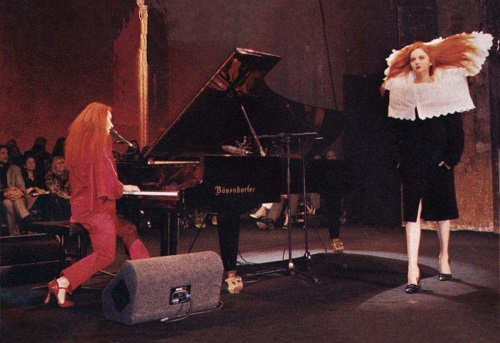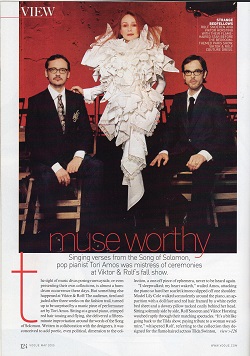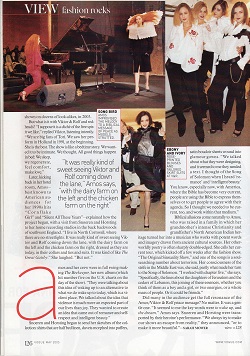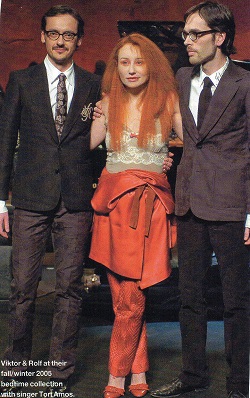|

songs | interviews | photos | tours | boots | press releases | timeline
Vogue (US)
May 2005

Muse Worthy
Singing verses from the Song of Solomon, pop pianist Tori Amos was mistress of ceremonies at Viktor & Rolf's fall show.
by Sarah Mower
The sight of music divas posing runwayside, or even presenting their own collections, is almost a humdrum occurrence these days. But something else happened at Viktor & Rolf: The audience, tired and jaded after three weeks on the fashion trail, turned up to be surprised by a manic piece of performance art by Tori Amos. Sitting at a grand piano, crimped red hair tossing and flying, she delivered a fifteen-minute improvisation around the words of the Song of Solomon. Written in collaboration with the designers, it was conceived to add poetic, even political, dimension to the collection, a one-off piece of ephemera, never to be heard again.
"I sleepwalked; my heart waketh," wailed Amos, attacking the piano so hard her scarlet kimono slipped off one shoulder. Model Lily Cole walked somnolently around the piano, an apparition with a doll face and red hair framed by a white eyelet bed sheet and a downy pillow tucked cozily behind her head. Sitting solemnly side by side, Rolf Snoeren and Viktor Horsting watched raptly through their matching spectacles. "It's a bit like going back to the Tilda show, paying tribute to a woman we admire," whispered Rolf, referring to the collection they designed for the flame-haired actress Tilda Swinton, shown on dozens of look-alikes, in 2003.
But what is it with Viktor & Rolf and redheads? "I suppose it is a cliche of the free spirit we like," replied Viktor, listening intently. "We are big fans of Tori. We saw her perform in Holland in 1991, at the beginning. She is the best. The show is like a bedtime story. We wanted it to be intimate. We thought, All good things happen in bed: We sleep, we regenerate, feel comfort, make love."
Later, kicking back in her hotel room, Amos--best known to American audiences for her 1990s hits "Cornflake Girl" and "Silent All These Years"--explained how the project began, with a visit from Snoeren and Horsting to her home recording studios in the back backwoods of southwest England. "I live in North Cornwall, where there are no streetlights. It was really kind of sweet seeing Viktor and Rolf coming down the lane, with the dairy farm on the left and the chicken farm on the right, dressed as they are today, in their collars and ties and suits. It was kind of like The Great Gatsby." She laughed. "But not."
Amos and her crew were in full swing making The Beekeeper, her new album (which hit number five on the US charts on the day of the show). "They were talking about this idea of waking up to an alternative to what we do wake up to today, which is a violent place. We talked about the idea that violence is much more an expected part of our lives than joy. They wanted to create an idea that came out of romance and self-respect and intelligent beauty."
Snoeren and Horsting began to send her sketches of the collection: shirts that are half bed linen, duvets morphed into puffers, satin boudoir sheets wound into glamour gowns. "We talked about what they were designing, and it seemed to me they needed a text. I thought of the Song of Solomon when I heard 'romance' and 'intelligent beauty.' You know, especially now, with America, where the Bible has become very current, people are using the Bible to express themselves or to get people to agree with their agenda. So I thought we needed to be current, too, and work within that medium."
Biblical allusions come naturally to Amos, who was raised in a family in which her grandmother's intense Christianity and grandfather's North American Indian heritage turned her into a musician who works with potent words and imagery drawn from ancient cultural sources. Her other-worldly poetry is often sharply double-edged. She calls her current tour, which kicked off a few weeks after the fashion show, "The Original Sinsuality Show," and one of the songs is a soul-searching number about terrorism. Her consciousness of the strife in the Middle East was, she said, partly what made her turn to the Song of Solomon. "I worked with chapter five," she says. "Specifically, the lines about the daughters of Jerusalem and the cedars of Lebanon, this joining of these essences, whether you think of them as a boy and a girl, or two energies, or a whole mass of people. Or it could be friends."
Did many in the audience get the full resonance of the Amos/Viktor & Rolf peace message? No matter. It was a gentle one. "It seemed to me the key words were to wake up, and the dream," Amos says. Snoeren and Horsting were transported by their heroine's performance. "We always try to make our shows an escape from reality," they announced, "or to make it more beautiful."

original article
 

[scans by Sakre Heinze]
t o r i p h o r i a
tori amos digital archive
yessaid.com
|